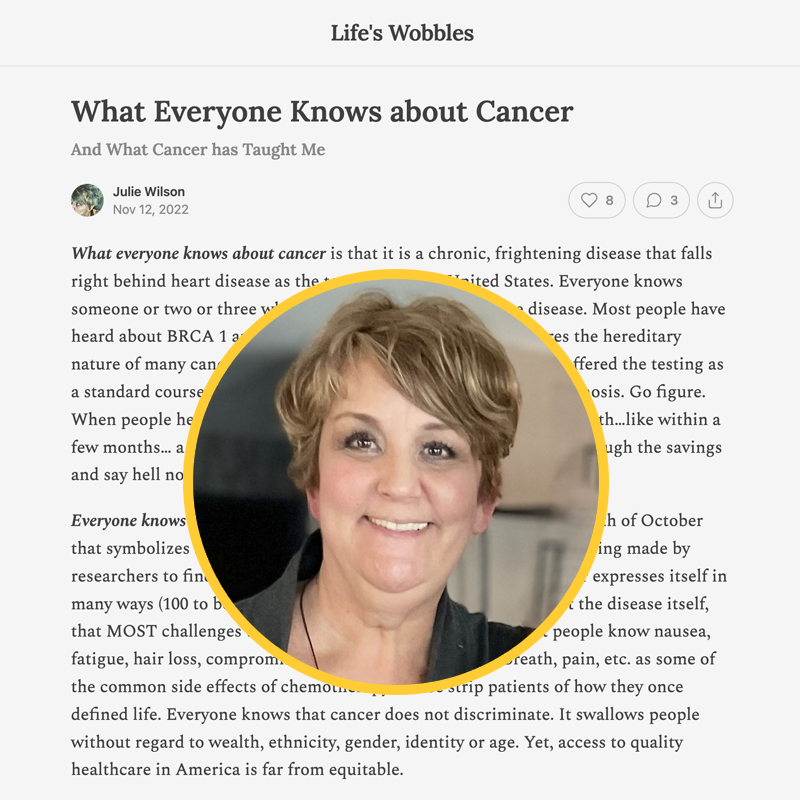What Everyone Knows about Cancer: And What Cancer has Taught Me
By Julie Wilson, CARE Patient
Originally published on Julie’s blog, “Life’s Wobbles”
What everyone knows about cancer is that it is a chronic, frightening disease that falls right behind heart disease as the top killer in the United States. Everyone knows someone or two or three who have been diagnosed with the disease. Most people have heard about BRCA 1 and BRCA 2 genetic testing which measures the hereditary nature of many cancers. Yet, most everyone I know has not been offered the testing as a standard course of healthcare. I received the testing after my diagnosis. Go figure. When people hear “stage IV”, most understand it to mean certain death…like within a few months… a good time to quit one’s job, travel the world, blow through the savings and say hell no to chemo?! I have heard it all.
Everyone knows breast cancer as the pink ribbon that festoons the month of October that symbolizes awareness and the collective efforts and resources being made by researchers to find a cure through world-wide clinical trials. Cancer expresses itself in many ways (100 to be exact) and oftentimes it is the treatment, not the disease itself, that MOST challenges the quality of a patient’s daily life. Most people know nausea, fatigue, hair loss, compromised immune systems, loss of breath, pain, etc. as some of the common side effects of chemotherapy. These strip patients of how they once defined life. Everyone knows that cancer does not discriminate. It swallows people without regard to wealth, ethnicity, gender, identity or age. Yet, access to quality healthcare in America is far from equitable.
What cancer has taught me is that it is easy to live life as if the next day is guaranteed, to believe it stretches on indefinitely with decades and decades of graceful aging followed by an easy, soft landing in one’s recliner. It has taught me how life cannot be planned, controlled, or orchestrated and how easy it is to believe our health is simply a matter of self-discipline - daily exercise and watching what we eat. Cancer has taught me that sometimes genes in a cell stop working properly and sometimes they become cancerous…just because. Cancer has proven to me that it can make me feel vulnerable, sad, and lonely even when sitting in a room full of friends and family. It has taught me that leaning on others is a sign of strength not weakness and having a disability means living a life redefined and slowing down is okay.
Cancer has challenged some of my assumptions. I used to think that a measure of success, happiness and health was more about making the right choices, doing the right things, and working really hard. Now I know the reality of the systematic disparities and injustices that permeate our system. I know the staging of my cancer, the lines of treatment I have been offered, and the discussions about clinical trials my oncologists have had with me are directly tied to the color of my skin, my education, the expression of my identity, my healthcare insurance, as well as my access to a quality healthcare team. I know there is much work to do in terms of educating the public on the disparities that exist when it comes to cancer care access and equity.
Yet, what I know about cancer today is it is a time of great optimism in the field of cancer medicine. The latest lines of treatments are targeted therapies drilled down to the genetic expression of each person’s disease. While not always covered by insurance and not an FDA approved standard means for determining treatment procedures, genetic lines of testing result in personalized treatment options that target each patient’s unique cancer (see Genetic Testing For Cancer). This testing is different than BRCA 1 and BRCA 2. Standard lines of treatment annhilate all cells; targeted therapies land a far softer punch due to their precision. I am grateful that this was one of the first conversations Dr. Blau had with me when I became her patient two years ago. Not all oncologist see genetic testing as a standard form of treatment; she does. These targeted therapies are a result of decades of diligent researchers and patients who said yes to clinical trials, when they could have said no (I did; see my post Clinical Trials). I have learned to trust and to say yes to clinical trials.
Cancer has taught me that getting second opinions and self-advocacy is an essential part of the treatment process and not something to be feared for the “message” it might send to our doctors. After the “Red Devil”, my first line of treatment, my then oncologist prescribed another 12 weeks of a standard chemotherapy called Taxol. This was when I visited Seattle Cancer Care Alliance for the first time and was told about Ibrance - a targeted therapy that had recently been FDA approved. I decided that I would take this line of treatment rather than the 12 weeks of Taxol. This choice changed my life and allowed me to return to work in the fall.
Oncologists are “book-smart” cancer experts who are definitely a fundamental member of a healthcare team; however, they are people just like ourselves who carry implicit biases, perspectives and opinions. I believe patients need to reframe their thinking and believe that the true experts in the room are themselves - the people diagnosed and living with the disease, rather than automatically and completely deferring to a doctor to make the best choices for them. Patients’ voices should carry equal weight and space in the room. For while Dr. Blau, someone with whom I greatly respect and who is clearly a notable expert in her field, described Halavan as a “tolerable” treatment,
I was quick to point out to her that for me it certainly was not.

